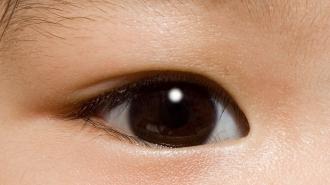A new mouse study suggests that a treatment currently targeting children with an inherited form of blindness may be able to help restore vision in adults, too.
The disorder: Leber congenital amaurosis (LCA) is an inherited eye disorder that affects the function of the retina, the thin layer of tissue at the back of the eye that converts light into electrical signals.
This dysfunction causes severe vision problems at birth or soon after and is a leading cause of childhood blindness.
“We were blown away by how much the treatment rescued brain circuits involved in vision.”
Sunil Gandhi
Synthetic retinoids: Researchers have been able to restore some vision in children with LCA by administering chemicals called synthetic retinoids to improve retina function — but the in-development treatment isn’t expected to have the same effect in adults.
That’s because, while vision starts in the eye, it doesn’t end there.
After the electrical signals are created, they need to travel to the central circuits of the brain. Those circuits are thought to form correctly only if the signals start arriving in childhood, when the brain’s neuroplasticity is most active.
Shot in the dark: UC Irvine researchers wanted to challenge that theory, so they administered synthetic retinoids to adult mouse models of LCA and were surprised at the activity they witnessed in the rodents’ brains.
“Frankly, we were blown away by how much the treatment rescued brain circuits involved in vision,” said corresponding author Sunil Gandhi. “The central visual pathway signaling was significantly restored in adults.”
“[This] supports a new concept,” he added, “which is that there is latent potential for vision that is just waiting to be triggered.”
Looking ahead: The fact that the brains of adult mice responded well to the synthetic retinoids doesn’t mean the treatment will be able to restore vision in adult human brains — many findings in rodents do not translate to people.
“There is latent potential for vision that is just waiting to be triggered.”
Sunil Gandhi
Still, the mouse study suggests that we shouldn’t assume adult brains wouldn’t be able to benefit from the treatment.
“Whenever you have a discovery that breaks with your expectations about the possibility for the brain to adapt and rewire, it teaches you a broader concept,” said Gandhi. “This new paradigm could aid in the development of retinoid therapies to more completely rescue the central visual pathway of adults with this condition.”
We’d love to hear from you! If you have a comment about this article or if you have a tip for a future Freethink story, please email us at tips@freethink.com.
